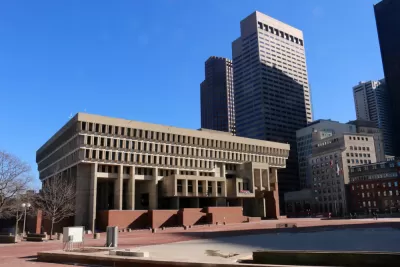The Boston Globe reports on reasons to suspect more conflicts of interest than there appears on the Boston Zoning Board of Appeal.

Milton J. Valencia and Tim Logan report on potential conflicts of interest on the Boston Zoning Board of Appeal.
A recent approval of a six-unit condo development on a small lot in the Dorchester neighborhood "illustrates the incestuous mechanics of a permitting system that is now enmeshed in an influence-peddling scandal, and highlights how the zoning board seems almost destined for potential conflicts of interest by the very way it is organized," according to Valencia and Logan.
"The composition of the Boston panel — under state law more than half of the board’s seats are held by people from the real estate and building industries — is unusual among US cities," according to the article. "And their twin allegiances come in conflict enough that recusals by board members are a regular occurrence."
So the six-unit condo development failed its first time at the board, but a consultant for the project was subsequently appointed to a seat on the board before the project was approved despite neighborhood opposition. The consultant, Craig Galvin, recused himself from the vote. "When the units hit the market, Galvin’s firm, Galvin Group, was the listing agent; the house sold in December for $750,000, according to deed records, and the two condos are each listed at $759,000."
The implication of conflicts of interest comes at time when the board is under scrutiny for the aforementioned influence-peddling scandal. "The board is under investigation by federal prosecutors, who have secured a guilty plea from a City Hall employee for accepting a bribe to influence a zoning vote on a project. A top aide to the mayor who ran the agency that reviewed permits has taken an unpaid leave, and the Walsh administration has launched an internal review of the board’s procedures."
In a related article published the same day, Logan reports on the effort by one city councilmember to reform the board's requirements for representation from the real estate and development industry.
FULL STORY: Boston’s zoning board is rife with conflicts

Maui's Vacation Rental Debate Turns Ugly
Verbal attacks, misinformation campaigns and fistfights plague a high-stakes debate to convert thousands of vacation rentals into long-term housing.

Planetizen Federal Action Tracker
A weekly monitor of how Trump’s orders and actions are impacting planners and planning in America.

Chicago’s Ghost Rails
Just beneath the surface of the modern city lie the remnants of its expansive early 20th-century streetcar system.

Bend, Oregon Zoning Reforms Prioritize Small-Scale Housing
The city altered its zoning code to allow multi-family housing and eliminated parking mandates citywide.

Amtrak Cutting Jobs, Funding to High-Speed Rail
The agency plans to cut 10 percent of its workforce and has confirmed it will not fund new high-speed rail projects.

LA Denies Basic Services to Unhoused Residents
The city has repeatedly failed to respond to requests for trash pickup at encampment sites, and eliminated a program that provided mobile showers and toilets.
Urban Design for Planners 1: Software Tools
This six-course series explores essential urban design concepts using open source software and equips planners with the tools they need to participate fully in the urban design process.
Planning for Universal Design
Learn the tools for implementing Universal Design in planning regulations.
planning NEXT
Appalachian Highlands Housing Partners
Mpact (founded as Rail~Volution)
City of Camden Redevelopment Agency
City of Astoria
City of Portland
City of Laramie





























